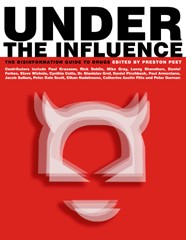DRCNet
Book
Review:
Under
The
Influence:
The
Disinformation
Guide
to
Drugs,
Edited
by
Preston
Peet
(The
Disinformation
Company
Ltd.,
2004,
312
pages,
$24.95)
12/24/04
special to Drug War Chronicle by Steve Beitler
In an essay called "A War on Sanity," law professor Paul Campos asks, "What level of government persecution will put a dent in public apathy about the madness that is the war on drugs?" Assuming that level exists, we are clearly not there yet, and smoldering frustration over the blindness of so many people simmers under the surface in many pieces. In an Editor's Note before two essays that close the book, Peet describes Under the Influence as "a book full of hard journalism and social commentary... it is hoped that you will be able to see past the lies and propaganda driving the War on Some Drugs and Users and vote for those representative (sic) who will end the War." Given the horrors that the book chronicle-olds, though, Peet's faith in elected officials to end the nightmare might seem naïve. The richest pieces combine historical detail with deeply skeptical analysis. In "Prohibition is Treason," Dan Russell declares that "prohibition is a neo-fascist protection racket... (it) is designed to be endless... and (it) has made the drug trade the economic basis of military power throughout the world." Russell brings together the origins of America's drug war with detail on how prohibition and drug profits have helped fund our close ties with foul regimes or rogue groups in client states who do America's dirtiest work while lining their own pockets. Russell's is a nice companion piece to Valerie Vande Panne's "A Brief History of the War on Drugs," which starts in colonial times to sketch "the roots of our drug war, grown... out of the zealous ignorance of a frightened, greedy, puritanical people." In just over two pages, Jay Cavanaugh, who served on the California State Board of Pharmacy from 1980 until 1990, lays waste to the pharmaceutical industry. The Food and Drug Administration, whose official mission is to regulate the industry in the name of public safety, "is in essence the enforcement arm for drug company extortionists... Drug companies spend more money on bribing doctors and politicians, and on advertising drugs folks don't need and would be better off without than they do on finding all of the miracle cures that are just around the corner." How many more Vioxx disasters are out there? Some of the essays wander into difficult territory even for those whose commitment to change is steadfast. Clifford Wallace Thornton, in a piece titled "Perceptions of Race, Class, and America's War on Drugs," says, "Another question is whether the drug policy reform movement is ready for an infusion of blacks... Reparations are an issue... that reformers don't want to address because of a feared backlash by the white populace." In "Beyond Health and Safety -- A hard look at really preventing drug abuse," Theo Rosenfeld writes that "we all fall into the same faulty binary logic when we advocate for honesty in drug education but stop at honestly explaining the dangers of drug use as well as fail to honestly speak of positive drug effects and experiences." Tricky syntax aside, Rosenfeld expresses a reality known to millions -- the power of positive drug experiences -- but acknowledged by few. Under the Influence provides information and insight that newcomers and veteran reformers can learn from. Its greatest achievement may be its ability to sustain a tone of resolve and confidence despite the steep uphill battle reformers are fighting.
|

